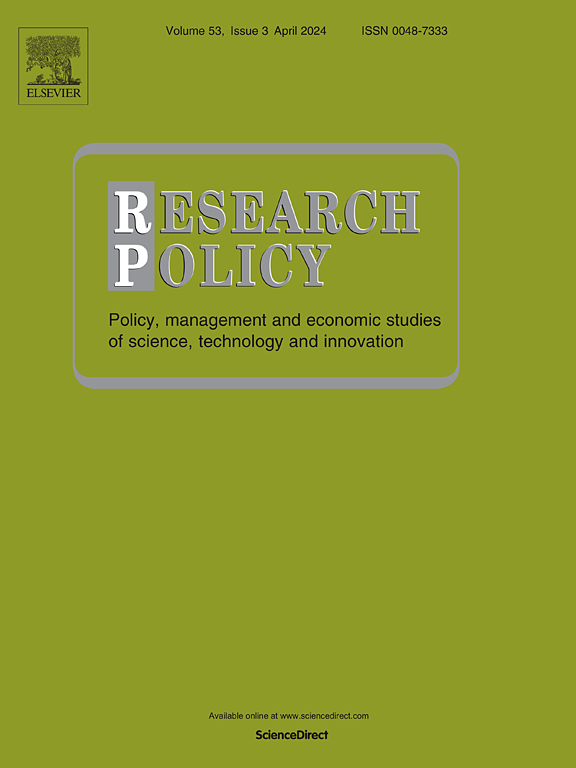创业生态系统的时钟滴答滴答——Coad和Srhoj的复制和扩展(2023)
IF 8
1区 管理学
Q1 MANAGEMENT
引用次数: 0
摘要
创业生态系统(EE)文献中的一个关键假设是,企业生态系统的质量与生产性创业的盛行之间存在正相关关系。最近,Coad和Srhoj(2023)认为,环境企业的质量也应该与生产性创业的持久性呈正相关。然而,通过对克罗地亚和斯洛文尼亚地区的高增长公司采用两种不同的衡量标准,他们没有发现生产性企业家精神持续存在的一致证据。这导致他们得出结论,EE框架对政策制定者没有价值。我们认为他们的概括是不正确的,他们的发现与情感表达方法的进一步阐明是一致的。我们在两项实证研究中建立了我们的论点。在研究1中,我们复制了荷兰Coad和Srhoj(2023)的方法,在那里我们发现了生产性企业家精神持续存在的有力证据。我们认为,复制研究中发现的差异可以通过考虑EEs的质量和大小来解释。在研究2中,我们对这一概念进行了进一步研究,提出了关于企业环境质量和规模对生产性创业持续性影响的两个新假设,但认为这种影响随着创业生态系统质量和规模的增加而减弱。我们的假设得到了欧洲EEs和创新型初创企业数据的支持。因此,我们的结果调和了文献中关于生产性企业家精神持久性的不同发现。从理论上讲,我们的工作通过解释生产性企业家精神的持久性,以及更普遍研究的生产性企业家精神的普遍性,进一步阐明了情感表达方法。最后,我们提出了研究结果的政策含义。本文章由计算机程序翻译,如有差异,请以英文原文为准。
The entrepreneurial ecosystem clock keeps on ticking – A replication and extension of Coad and Srhoj (2023)
A key hypothesis in the entrepreneurial ecosystem (EE) literature is that a positive relation exists between the quality of EEs and the prevalence of productive entrepreneurship. Recently, Coad and Srhoj (2023) argued that the quality of EEs should also be positively related to the persistence of productive entrepreneurship. However, using two different measures for high-growth firms in regions in Croatia and Slovenia, they found no consistent evidence for the persistence of productive entrepreneurship. This led them to conclude that the EE framework is not valuable for policymakers. We contend that their generalization is incorrect and that their findings are consistent with a further articulation of the EE approach.
We build our argument in two empirical studies. In Study 1, we replicate the approach by Coad and Srhoj (2023) in the Netherlands, where we find strong evidence for the persistence of productive entrepreneurship. We argue that the differences found in the replication study can be explained by accounting for the quality and size of EEs. In Study 2, we follow up on this notion by formulating two new hypotheses about the effect of quality and size of EEs on the persistence of productive entrepreneurship but argue that this effect decreases in strength as the quality and size of entrepreneurial ecosystems increase. Our hypotheses are supported by data on EEs and innovative start-ups in Europe. Accordingly, our results reconcile the different findings in the literature regarding the persistence of productive entrepreneurship. Theoretically, our work provides a further articulation of the EE approach by explaining the persistence of productive entrepreneurship, in addition to the more commonly studied prevalence of productive entrepreneurship. We conclude with policy implications of our findings.
求助全文
通过发布文献求助,成功后即可免费获取论文全文。
去求助
来源期刊

Research Policy
MANAGEMENT-
CiteScore
12.80
自引率
6.90%
发文量
182
期刊介绍:
Research Policy (RP) articles explore the interaction between innovation, technology, or research, and economic, social, political, and organizational processes, both empirically and theoretically. All RP papers are expected to provide insights with implications for policy or management.
Research Policy (RP) is a multidisciplinary journal focused on analyzing, understanding, and effectively addressing the challenges posed by innovation, technology, R&D, and science. This includes activities related to knowledge creation, diffusion, acquisition, and exploitation in the form of new or improved products, processes, or services, across economic, policy, management, organizational, and environmental dimensions.
 求助内容:
求助内容: 应助结果提醒方式:
应助结果提醒方式:


